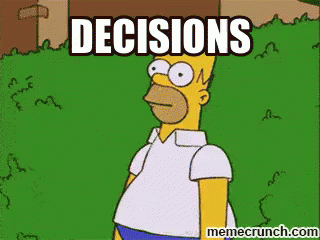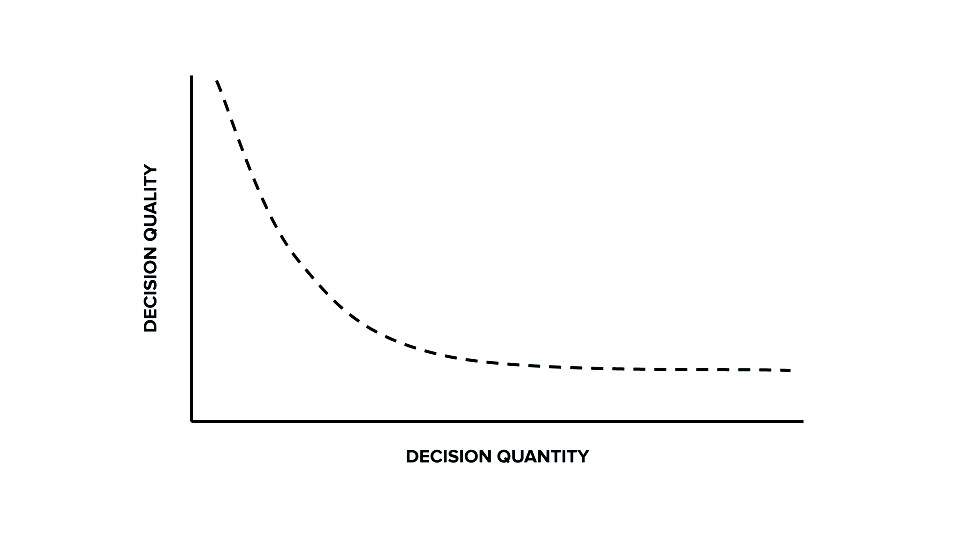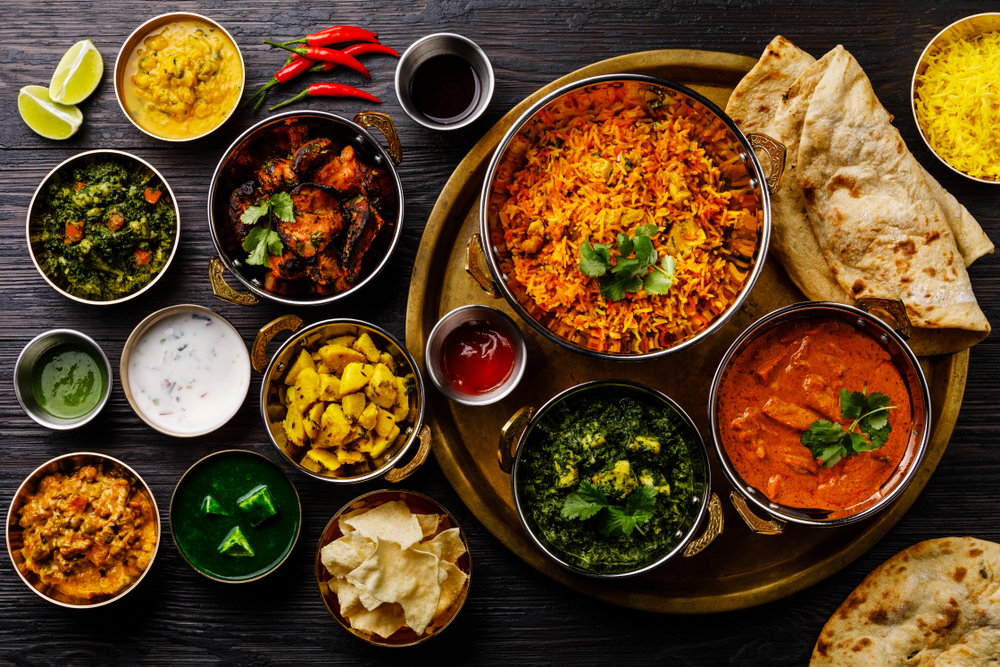Who hasn’t had the mentally draining experience of flipping through too many choices and eventually saying, “I can’t deal with this right now”? Even so, there is an active debate over whether decision fatigue is a real thing, because scientists can’t seem to find consistent data that supports this idea.
Do you know what Mark Zuckerberg, Barack Obama, Angela Merkel and Christopher Nolan all have in common? They wear the same kind of outfit every day. The greatest scientist humanity ever produced, Albert Einstein, had five similar grey suits as the entirety of his wardrobe. What’s with geniuses and their limited clothing choices?
When asked about why they do it, many successful people cite a phenomenon called decision fatigue. So, what is decision fatigue and how can we overcome it? Will wearing the same thing every day do the trick? Or is there a deeper psychological element at work here?
Let’s find out!
What Is Decision Fatigue?
Like it or not, decision-making is a part and parcel of our everyday lives. From the moment we wake up, we deal with an endless stream of choices—when to get up, what to eat, what to wear, and so on. The human brain makes about 35,000 decisions per day, most of which we may not even be aware of.
So, what happens when making decisions stresses us out? Does our brain really get overwhelmed when it is forced to deal with too many choices?

To clarify… imagine yourself in these situations.
- You enter a store, add items to your cart, but suddenly feel so overwhelmed by the large number of options displayed all around you that you leave without finishing your shopping.
- You’re feeling worn out and cranky after a hectic day at work. Then you find yourself snapping at a family member or friend without any good reason when they ask where you want to eat that night.
- You spend a night tossing and turning in bed trying to make up your mind about your relationship, career or some other pressing issue.
Do any of these examples sound familiar? If yes, then you might be experienced in experiencing decision fatigue.
Decision fatigue is a state when the mind becomes exhausted after making too many decisions within a short amount of time.
Also Read: Why Do We Sometimes Feel Tired All Day, But Wired At Night?
What Causes Decision Fatigue?
It is a no-brainer that when we are presented with too many options, we have moments of feeling overwhelmed, stressed out, weary and almost queasy—unable to think. It’s sort of like the physical fatigue you’d experience after a long workout session at the gym, except the tiredness starts in your mind, not your muscles.

In this state, one may feel tired, have “brain fog”, become easily irritable, and may even experience other signs of physical or mental exhaustion.
Lending credence to this idea, the term ‘decision fatigue’ was originally introduced by social psychologist Roy F. Baumeister. This concept is rooted in Freud’s id-ego-superego model of the human mind. Decision fatigue is seen as a symptom of ego depletion.
“Ego” in this sense is being used not in the colloquial sense of having too much pride, but as it is used in Freud’s famous psychoanalytic theory. Ego is the part of mind that manages the link between the conscious and the unconscious mind.
So, what is the ego depletion theory of willpower? The idea is that we have a limited amount of mental energy (see: willpower and self-control) that can decrease over time.
For example, imagine that you have healthy meals for breakfast and lunch. You also exert enough self-control to say no to donuts at work and the french fries a friend offers you. Then, at the end of the day, you can’t help letting loose and find yourself binging on a pile of unhealthy snacks and beverages.
Why does it happen? By going against those little indulgences all day long, you have spent all your available willpower—the limited mental strength you had. Now, you have arrived at a state of ego depletion, where you can easily lose self-control.
Decision fatigue is therefore a psychological concept that has gathered a lot of steam since the 1900s. The question is… is it real?
To find that answer, we must understand whether we have been thinking about willpower and self-control in the right way.
Also Read: Why Do We Tire More Easily As We Age?
Ego Depletion Research: Are We In A Pickle?
Most modern psychiatrists disagree with Sigmund Freud on many concepts, and the same applies to decision fatigue, a theory based on Freud’s psychoanalytic understanding of the human mind.
Researchers have carried out more than a hundred studies—yet they have found no concrete evidence that confirms the effects of ego depletion. In addition, the replication crisis in psychology (difficulty in repeating previous scientific studies) puts the credibility of old findings into question.
In some cultures, there is evidence of reverse ego depletion, where challenging mental activities (like making tough choices) do not deplete willpower, but actually enhance it! A study shows that while Americans tend to believe that difficult mental tasks can leave us drained, Indians find that the more difficult an initial mental task, the better energized they are to face the next challenge.

Furthermore, research reveals that whether ego depletion exists or not depends on a person’s basic belief. When people believe in the willpower (limited-resource) theory, they tend to show the ego-depletion effect.
Does this mean that decision fatigue is a myth? Probably not. There’s more to the story…
Reaching The Final Verdict… Let’s Wait Until Lunch?
While researchers haven’t found compelling evidence in the defense of the ego depletion effect, they cannot fully reject the idea either.
One of the most popular examples comes from the judicial system. Research shows that judges are more likely to grant parole to prisoners early in the day or right after a break (such as lunch).
As the day goes on, mental weariness sets in. Because of this decision fatigue, judges are more likely to reject parole requests, and be on the safe side, so they don’t end up releasing dangerous prisoners due to their impaired decision-making capacity.

Studies also suggest that mental fatigue is real. It happens due to the build-up of a compound called glutamate in the prefrontal cortex, a structure in the brain that plays a key role in decision-making. This is why our brains feel tired after work.
Other Effects Of Decision Fatigue
When shopping, have you ever wondered why candy, soda and other junk food is usually placed by the checkout counter?
By the time we reach the end of the store aisle, we have already gone through the tiring process of weighing all the options (the dizzying range of prices, offers). Thus, we end up tossing a few unhealthy items into the cart and give in to impulse purchasing.
The other way people may react to decision fatigue is decision avoidance. When we have too many options to choose from, it is hard to make up our mind, so we end up choosing nothing. This experience is referred to as choice paralysis or decision paralysis. Retailers know that this is a key reason why people sometimes abandon their shopping carts in the middle of a store.
Since there are so many examples of decision fatigue in our daily lives, we can assume that it must be real in some way.
A Final Word
So, what should you do when you’re tired of making decisions?
Einstein himself said that he chose the same gray suit every day, “So that I don’t waste any brainpower in the mornings deciding which set of clothes to wear.”
Whether decision fatigue exists or not, it all boils down to this equation:
Having fewer choices = less time and energy wasted = a simplified life!
The best way to achieve this is to stick to a routine of regular tasks. That way, your brain doesn’t have to sweat those little, mundane decisions every day. While shopping or doing any kind of cognitively demanding activities, try to make a list, and cross things off as you go. This will reduce decision fatigue and help you make choices more rationally, fairly, and objectively… not to mention the dopamine burst every time you tick off a box!
How well do you understand the article above!

References (click to expand)
- Pignatiello, G. A., Martin, R. J., & Hickman, R. L., Jr. (2018, March 23). Decision fatigue: A conceptual analysis. Journal of Health Psychology. SAGE Publications.
- Englert, C., & Bertrams, A. (2021, May 6). Again, No Evidence for or Against the Existence of Ego Depletion: Opinion on “A Multi-Site Preregistered Paradigmatic Test of the Ego Depletion Effect”. Frontiers in Human Neuroscience. Frontiers Media SA.
- Savani, K., & Job, V. (2017, October). Reverse ego-depletion: Acts of self-control can improve subsequent performance in Indian cultural contexts. Journal of Personality and Social Psychology. American Psychological Association (APA).
- Job, V., Dweck, C. S., & Walton, G. M. (2010, September 28). Ego Depletion—Is It All in Your Head?. Psychological Science. SAGE Publications.
- Wiehler, A., Branzoli, F., Adanyeguh, I., Mochel, F., & Pessiglione, M. (2022, August). A neuro-metabolic account of why daylong cognitive work alters the control of economic decisions. Current Biology. Elsevier BV.
